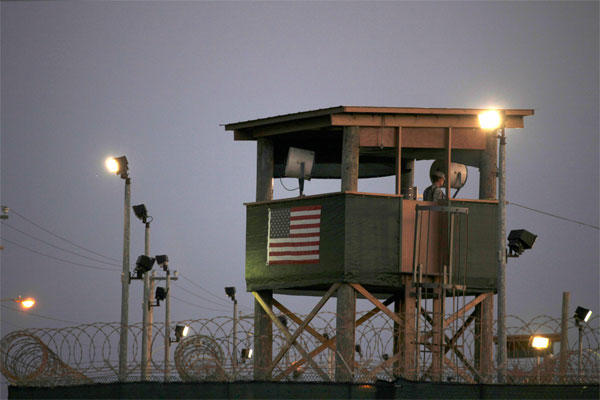The U.S. will be left indefinitely with "dozens" of prisoners from Guantanamo who cannot be released or transferred for fear of their return to terrorism despite the renewed push by the White House and the Pentagon to close the detention facility, Gen. Martin Dempsey said Sunday.
Dempsey, the chairman of the Joint Chiefs of Staff, said he favored closing the Guantanamo Bay detention camp at the U.S. naval base in Cuba but warned that "there's going to be dozens that have to be detained" as continuing threats to the homeland.
Those dozens "should simply not be released," Dempsey said on the Fox News Sunday program. What to do with them was a political decision, Dempsey said, and he offered no opinion on what course the White House and Congress should take on the detention facility that is administered by the U.S. Southern Command.
Dempsey did offer the opinion that Guantanamo existed in a legal limbo outside the boundaries of U.S. law and the Uniform Code of Military Justice, and served as a recruiting tool for Al Qaida and other terror groups.
"I've been in the group that believes (that Guantanamo) creates a psychological scar on our national character," Dempsey said.
On NBC's "Meet The Press" program, Clifford Sloan, who was the State Department's special envoy on closing Guantanamo until Dec. 31, said "I believe Guantanamo is going to be closed" before President Obama leaves office.
"No one should underestimate President Obama's determination on this issue," he said.
The Guantanamo detention camps have been a vexing issue for the U.S. since the first 20 prisoners from Afghanistan were brought there in January 2002.
Obama campaigned for his first term on the Guantanamo issue and pledged to close the detention facilities as one of his first acts upon taking office in January 2009. Congress has thus far blocked Obama and Attorney General Eric Holder on bringing some of the prisoners to the U.S. for detention or trial in U.S. federal courts.
In 2003, Guantanamo held more than 800 prisoners and that number has now been reduced to 127 as the White House has renewed the push to empty the facility before Obama leaves office. In recent weeks, six prisoners have been transferred to Uruguay and five to Kazakhstan.
The Guantanamo issue has been thrust back into national attention Obama's recent move to establish diplomatic relations with Cuba and the terror attacks in Paris last week. One of the attackers had been released after serving time in a French jail.
Sen. Angus King, I-Maine., said the Paris attacks would be a factor in Congressional opposition to closing Guantanamo. "I think you've got to be thinking about that," King said of the Paris attacks on MSNBC last Friday.
"You know, Guantanamo, I was down there about a month ago, and it is a recruiting tool for these people. There's no doubt about that," King said. "On the other hand, it's a secure facility" and it's also "the most expensive prison in the world by a factor of about a hundred. But you know, you can call it either way."
"Some percentage of these people will end up back on the battlefield," King said. "On the other hand, if it's a recruiting tool that brings in ten times that number, that's the kind of decision that the president and the Congress have to weigh."
On "Meet The Press," Sloan said that about 6.8 percent of Guantanamo detainees return to terrorism, although other estimates put the percentage at 18-30 percent.
Sloan said that 59 of the current 127 detainees at Guantanamo have been cleared for release or transfer by an interagency review team including the White House, the Pentagon and Homeland Security.
However, 52 of the 59 cleared detainees were from Yemen, and the political chaos in that country currently barred their release to Yemen "at this point," Sloan said.
The administration's goal was to reduce the Guantanamo population to a number small enough before Obama leaves office that Congressional opposition to their transfer to the U.S. for disposition will erode, Sloan said.
-- Richard Sisk can be reached at richard.sisk@military.com






























